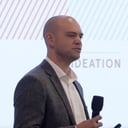Related
webinar
How to Get a Job in Data
In this session, you'll learn what hiring managers look for in candidates for data analyst and data scientist roles, and get tips on how to prepare yourself for the hiring process and your first weeks on the job.webinar
Unleashing Data Teams in 2023: Insights from data leaders
Ask a Hiring Manager — The Keys to Landing a Job in Data Sciencewebinar
Radar—Ask a Hiring Manager: How to Land a Job in Data Science
Learn the key tactics that can help you stand out from the crowd.webinar
How Data Leaders Should Approach Early Data Hires
Learn how to specify, scout, interview, and onboard your first data hireswebinar
Manage Data Science Projects Effectively
Best practices in data science project managementwebinar
